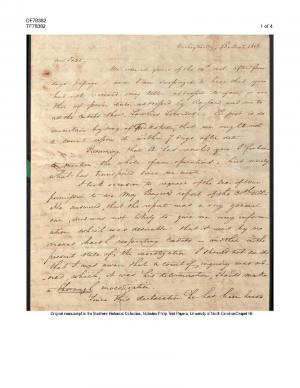Wilson M. C. Fairfax to Nicholas P. Trist
| Dear Trist, | Washington-City, 23d Decr 1818. |
We received yours of the 14th inst. after four days passage: and I am surprized to hear that you had not received my letter addressed to you or another of prior date addressed by Ragland and me to all the Cadets thro’ Lawlins Lowndes: The post is so uncertain by way of Peekskill, that we ought not to count upon it within 7 days after date.
Presuming that it has reached you I forbear to mention the whole of our operations; but merely what has transpired since we wrote.
I took occasion to request of the Sec. of War permission to see Maj. Thayer’s report of the 30th ult. He answered, that the report was a very general one, and was not likely to give me any information which was desirable: that it was by no means harsh respecting Cadets—and that in the present state of the investigation I should not see it: that I was aware that a court of inquiry was ordered, which, it was his determination should make a thorough investigation.
Since this declaration he has been heard to say in public that he highly disapproved of the sentiments expressed by an officer a gentleman whom he heard upholding Bliss’ conduct,—and “that no young men who should submit to take a blow ought to be permitted to enter the Army.”
Ragland has just received an answer to his letter to Genl Scott. who has expressed himself in a manner truly worthy both of his rank in the Army and of the country which gave him birth.
His letter expresses strongly the feelings of the man struggling with the Duty of the Genl officer. It would be improper for an officer to give his opinion on a subject which is likely to Come before a court Ml of which he may be either a member or the President—because this would incapacitate him for the duty: but he has no hesitation in saying: “that no court can hesitate to punish, in an exemplary manner, the conduct ascribed to the instructor of tactics, if it be judicially proven.” The Genl expresses his admiration of the “sentiments” expressed by the cadets thro’ their committee, which he calls: “noble and intrepid ” and says: “I should look upon it as a great misfortune to themselves & the army,” if they (the committee) should not have a “fair opportunity presented to them of returning to West Point, and completing their studies.” These sentiments are my dear Trist those of the Army in general. But what is this opportunity—I fear it will never be consistent with the most sacred feelings of “honour,” for us to return: I cannot consent to be a cadet if the corps receives any blame for their procedure. Bliss must be broke: & the cadets entirely exculpated The Genl says: “I fear you will never obtain [. . .] triumph, however strongly your cause m[. . .] founded in justice and honour. To secure the cadets from similar outrages, in future, will be result of the enquiry set on foot.” I was acquainted with the appointments mentioned in my our letter: and am glad hear you are pleased with that noble fellow Baker.
Enclosed is a small return for the many testimonies of regard you have bestowed on me I’m sorry it is not in my power to offer any thing better worth acceptance. Give to all the cadets who have American hearts; and accept for yourself, my hearty esteem.
